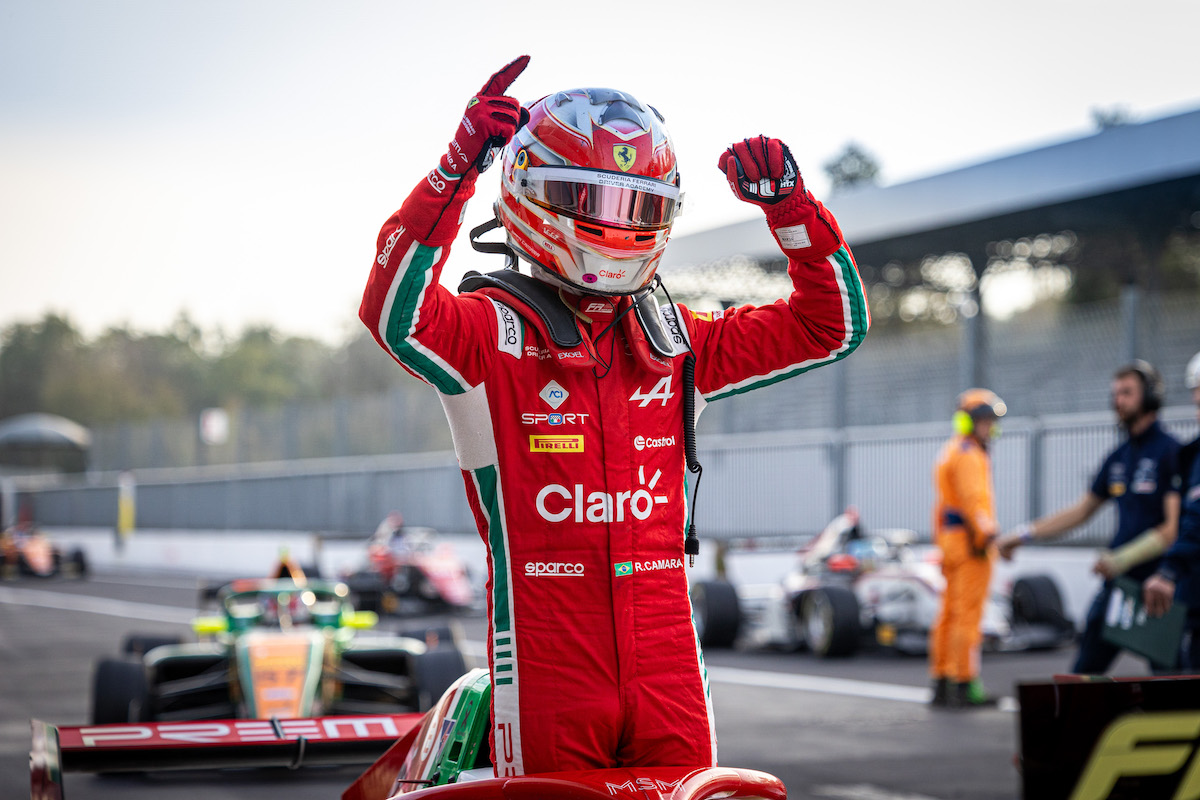
Photos: Dutch Photo Agency
While Rafael Camara raced away to the title, several other drivers also proved their potential in another deep FREC field. Roger Gascoigne was following their seasons from the paddock for Formula Scout
With greater consistency allied to his proven speed, Rafael Camara raced to an unassailable early lead to beat a quality field to the fourth Formula Regional European Championship by Alpine crown.
However, the battle behind him was a cracker as Van Amersfoort Racing and a resurgent ART Grand Prix joined the previous season’s pace-setters, Prema and R-ace GP, at the front.
The field arguably had more strength in depth than ever, with the reigning Formula Regional Middle East and Oceania champions Tuukka Taponen and Roman Bilinski, as well as seven Formula 4 champions: Alessandro Giusti and Evan Giltaire (both French F4), Ugo Ugochukwu (Euro 4), Theophile Nael (Spanish F4), James Wharton (F4 United Arab Emirates), Pedro Clerot (Brazilian F4) and Marta Garcia (F1 Academy).
Having again followed the series trackside from the warmth of Hockenheim in the spring to the autumnal rain at Monza, Formula Scout looks back on a memorable season that had seven race winners and a dominant champion.
Camara out of the shadows
Since stepping up to single-seaters in 2022, Camara had hitherto found himself in the shadow cast by his predecessor as champion, Andrea Kimi Antonelli, from the other side of the Prema garage.
No more. The 19-year-old Brazilian clearly profited from the decision by Prema and his backers at Ferrari to return for a second season at this level, oozing serenity and confidence from the opening day of the season.

With four wins and two seconds from the first three rounds giving him a 73-point margin over R-ace’s Tuukka Taponen in second, Camara effectively had the title in the bag before the teams left the Dutch dunes at Zandvoort in early June.
Taponen had taken his maiden European win at Zandvoort, and when he went on to win the next three races, at Budapest and Mugello, it looked as though we might still get a title fight between the two Ferrari juniors after all.
However, the Finn wouldn’t win another race as his team seemed to lose its way slightly in the second half of the year, struggling with straightline speed and unable to find the right balance.
Instead, it was Camara’s Prema team-mate James Wharton who took the overall runner-up spot after a late-season run of success netted him four wins, including a brace in Barcelona.
The season can be neatly divided into thirds, with different drivers coming to the fore at different stages. However, Camara was always in the mix, apart from a frustrating weekend at the Red Bull Ring in September where he failed to score, after a coming-together with R-ace’s Zachary David left him needing to pit to change his front wing.
| Rounds 1-3 | Points | Rounds 4-6 | Points | Rounds 7-10 | Points |
|---|---|---|---|---|---|
| Rafael Camara | 136 | Taponen | 97 | Wharton | 145 |
| Tuukka Taponen | 63 | Badoer | 87 | Camara | 97 |
| Alessandro Giusti | 52 | Camara | 76 | Giusti | 90 |
| Brando Badoer | 46 | James Wharton | 61 | Theophile Nael | 67 |
| Evan Giltaire | 43 | Giusti | 53 | Noah Stromsted | 57 |
Camara went the whole year without once qualifying outside the top four in his qualifying group, an impressive performance given the tight gaps between competitors in such a closely-matched field. Unsurprisingly, he thus also topped the average qualifying times.
Sophomore Camara came out of the blocks fastest, exploiting his experience to take pole and victory in the season opener.
“We started really well,” he says modestly. “We did a very good job in testing.”
“There was new geometry so we needed to change things a bit,” he adds, referring to steering changes introduced to help the three women in the starting field, as revealed by Formula Scout before the season.
“But we managed to do a good job and start the season in a good way [which] helped us a lot to keep a good margin in the beginning and from then [our task] was just to manage.
“I really pushed myself off the track to make sure I was prepared for this year. I just said there are many drivers who are very fast, very good so you need to be every weekend the best of you and not do mistakes and I think we managed pretty well,” he reflected at Monza after the final round.
At Hockenheim, he told Formula Scout that his priority was to work on consistency, eliminating some of the errors that had cost him points in his first season in FREC.
Twelve podiums in 20 races underline the progress made in that respect. Though he could not continue his early season momentum, he didn’t need to. Fittingly, he rounded off the year with his seventh victory.
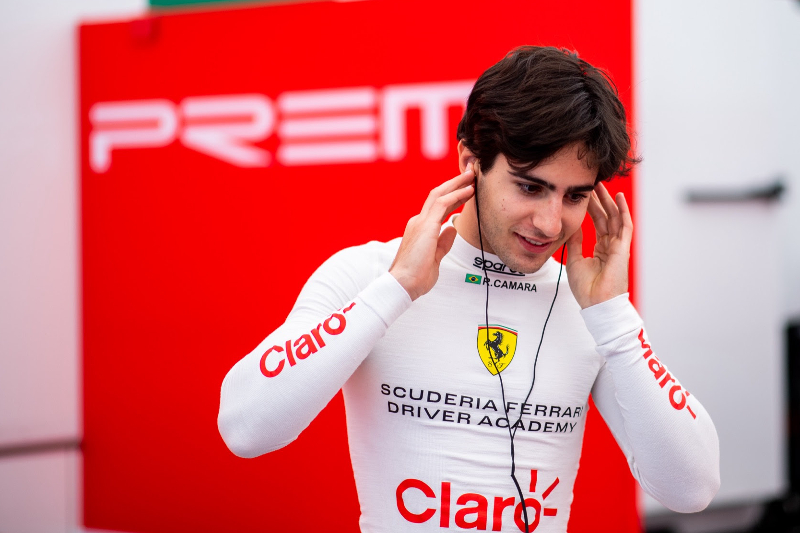
Photo: Prema
“I was expecting [the consistency],” he says. “I was working very hard for that. I really wanted to do a good job. Prema did an amazing job all year. The car was every time really good. We never had any issue, only the Red Bull Ring was not very good but the rest we managed pretty well.
“I was just giving my best on track, doing what I love to do and enjoying it.”
The reward came at Barcelona as he wrapped up the title, with one round remaining. “On the in-lap in Barcelona everything just comes into your mind since you started racing, a lot of things, all the dedication I have from the age of six. Basically, your whole life that you are working for that. It was very emotional even if I am not an emotional guy. I wanted to cry on the in lap,” he admitted after the season.
His record points total of 309 surpassed Antonelli’s score by nine, while his advantage of 73 over Wharton was the largest in the four seasons since the series’ merger with the Formula Renault Eurocup.
Camara will leave Prema after three years with the team, as he graduates to FIA Formula 3 with Trident. Unsurprisingly, leaving the only team he has known in cars is an emotional step. “It has been a long journey. Three years together. I learned a lot with them. I think when I arrived at Prema I was maybe a little lazy but I have been improving.
“Working with very good professionals, very good persons, that made me grow up as a person not only on track but outside as well, and to do the things properly. I will miss them,” he said, with more than a hint of sadness in his voice.
As he accepted the champion’s trophy he paid tribute to the individuals around him at Prema: his engineer, Emeric Sorin, in their first year together, although Camara admitted that he was “sometimes a bit too hard on him but he was always very calm and nice to me,” and mechanics Ale[ssandro] Di Biase and Alberto Trentin. “They were always with me and were very special to me,” Camara added with obvious feeling.
Contrasting fortunes for Camara’s team-mates
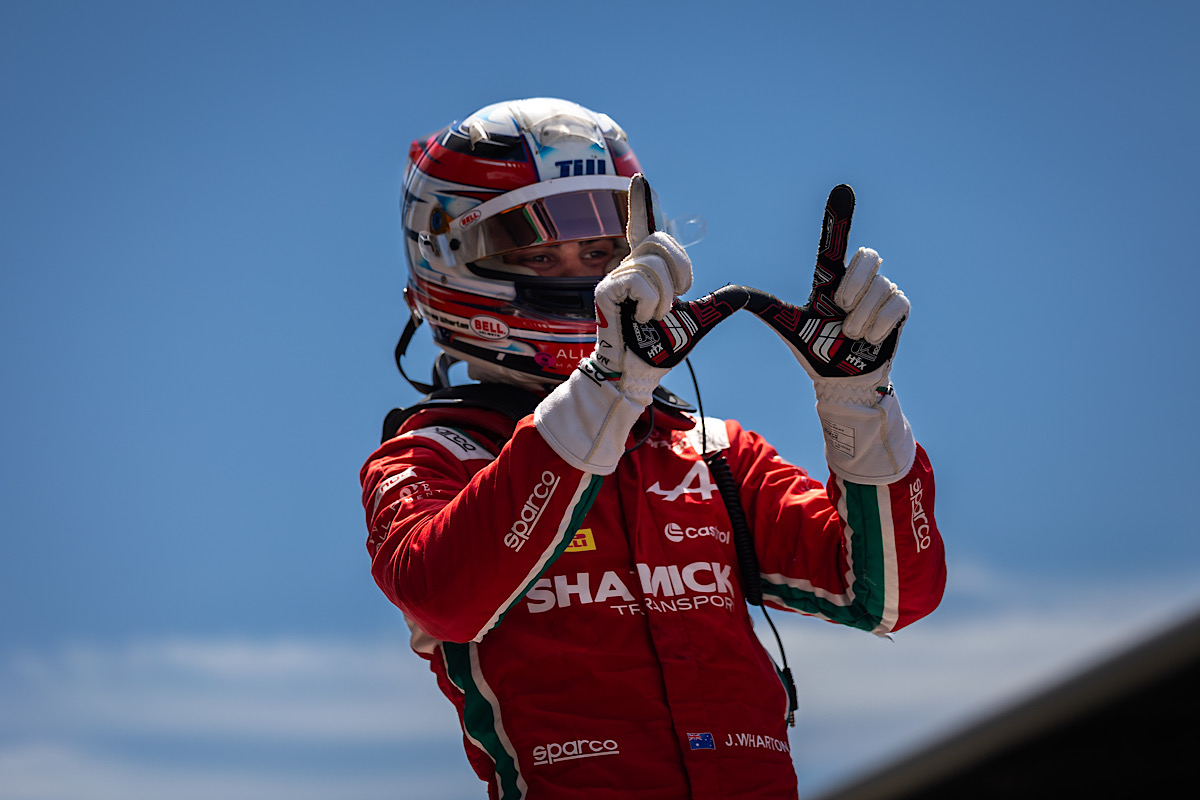 Prema came into the season looking to take a hat-trick of teams’ titles. Joining from a organisation role in the Ferrari Driver Academy to become team manager was Alessandro Vantini.
Prema came into the season looking to take a hat-trick of teams’ titles. Joining from a organisation role in the Ferrari Driver Academy to become team manager was Alessandro Vantini.
Alongside Camara, the team promoted two of its Formula 4 graduates, James Wharton and Ugo Ugochukwu. Each was capable of winning, although it took Ugochukwu until the last round, and a slice of fortune with free practice determining the grid after qualifying was abandoned, to finally notch up a win.
As Camara says: “With James and Ugo, [I had] two very quick drivers in the team, so we could push each other and I think we did that very well. I am very happy for that.”
Wharton, in particular, had the pace from the outset, but a combination of errors, such as spinning out of the lead in Zandvoort, and incidents, prevented him from turning his speed into results, leaving him over 100 points adrift of Camara after three rounds.
The Australian was a completely different person, on and off track in 2024. Outside the confines of the FDA, he seemed to blossom, growing in maturity and confidence as the season wore on.
He has a fine sense of self-deprecating humour, something that seemed to be hidden too often in the past.
Win number one came in stifling heat at Mugello in July, and once he had broken his duck, he was a force throughout the rest of the season. He finished on the podium in seven of the last eight races, and was fifth in the other, with the undoubted highlight being a dominant weekend in Barcelona, converting two pole positions into a double triumph.
“It’s been a good second half of the season. I finally put everything together. We had the pace at the start of the season but a couple of mistakes from my side really cost us. I’m happy to finish as ‘vice-champion’.
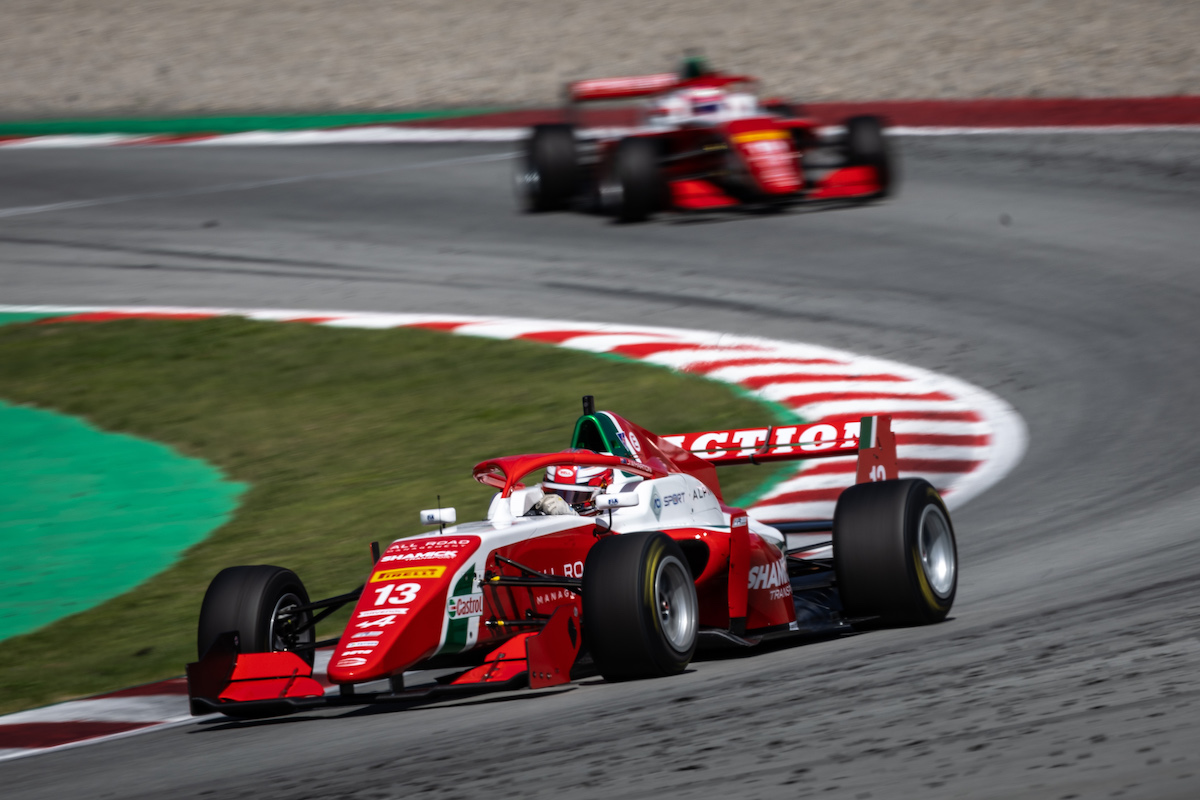 “Barcelona I would say is my favourite track now! It was a really good weekend but I’ve been fast every race. This weekend [at Monza] I was just a bit more cautious to make sure I became ‘vice-champion’ but Barcelona was amazing and hopefully every weekend’s like that from now on,” he enthused after the flag fell.
“Barcelona I would say is my favourite track now! It was a really good weekend but I’ve been fast every race. This weekend [at Monza] I was just a bit more cautious to make sure I became ‘vice-champion’ but Barcelona was amazing and hopefully every weekend’s like that from now on,” he enthused after the flag fell.
“From P5 before the summer break to finish P2 means I’ve done a mega year. It’s a bit bittersweet because I know I’ve had the pace to fight with Rafa. I gave it to him a bit too easily in the end but I’m happy with second,” he said, before adding graciously that “Rafa’s done a mega year this year so to finish second to him, I’m still honoured and still really proud of myself.
“The team have done a mega job this season. I’ve had the car at nearly every race weekend. Four wins, five pole positions. I can’t wait for next year, but I can’t thank the team enough.”
Like Camara, Wharton is also graduating to FIA F3 but with a different team, in his case ART Grand Prix, and similarly, emotions ran high. “Leaving the team and my engineer Nico [Martin] after three years. He cried a bit on the in lap and so did I,” admitted Wharton after the race.
Prema rounded off a dominant campaign, in which it secured the title with a massive 263-point margin, with a 1-2-3 finish in the penultimate race, the first time a team has managed the feat since R-ace in the same event at the same circuit in 2021.
For Vantini, “it was a fantastic conclusion to our campaign this year. It was very emotional to see our three drivers together on the podium. It was to the merit of everyone and a fantastic way to close the season.
“When you have three very good drivers, they tend to push each other and, of course, you can see that you can count on a good start to the season. You have a lot of motivation and that helps a lot to bring the momentum to each race.
“With relentless work from everyone you are able to achieve this kind of result. It’s an absolute privilege to represent such a good group of people,” he said as he proudly held the teams’ trophy aloft.
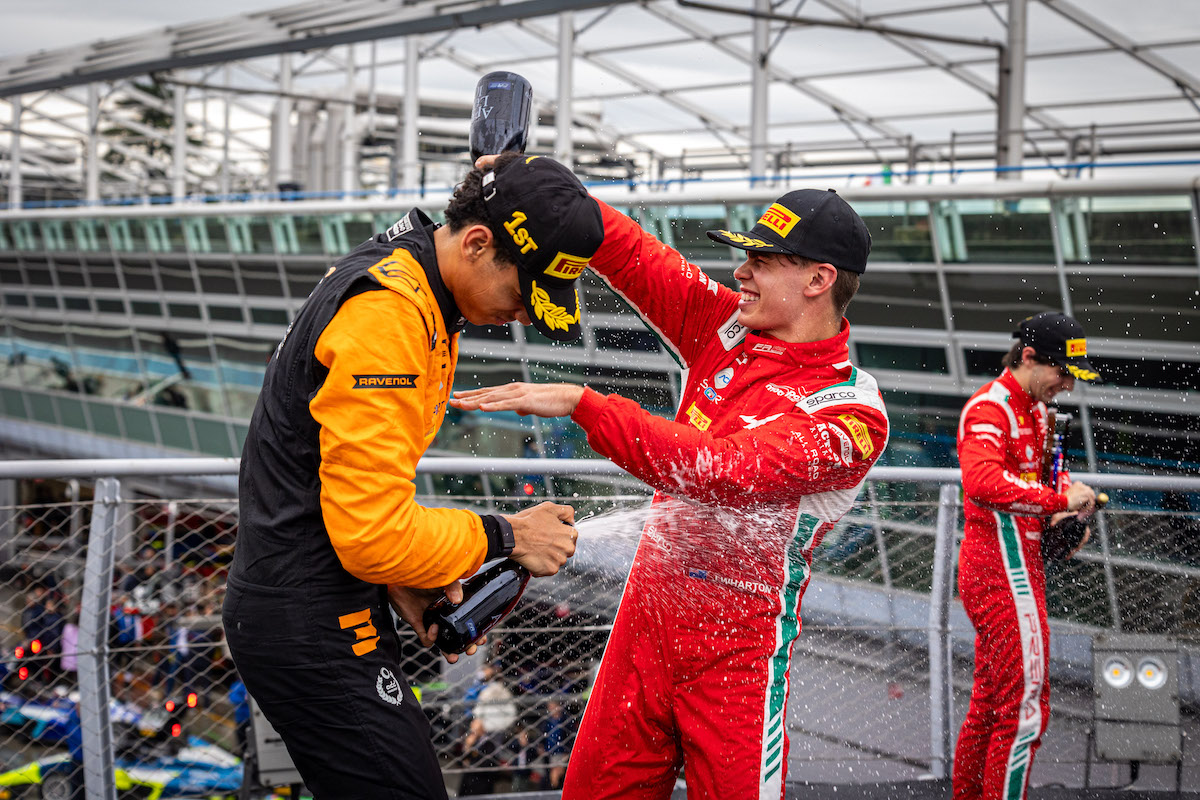
McLaren junior Ugochukwu suffered a trying season, with Prema team principal Rene Rosin conceding that the difficulties were not of the American’s making. Issues with two engines led to his disqualification in Paul Ricard after the team felt they had no choice but to introduce a third powerplant.
Ugochukwu is never the most loquacious driver on the grid, but at times seemed to struggle against his team-mates, so his late victory brought some compensation. However, his career highlight came in FRegional;s new-for-2024 blue riband event, the Macau Grand Prix, when he dominated proceedings in a one-off outing for R-ace.
Unlike his team-mates, however, Ugochukwu will stay with Prema for the move to FIA F3.
Taponen stars even as R-ace challenge fades
R-ace did manage to nab second place in the teams’ championship by a single point in the final race, courtesy of an eighth place from David, but overall it was still a disappointing year for the team that has run Prema the closest since the creation of the championship in its current form.
Taponen was expected to challenge for the title on the back of his Middle East success, even though he had not fulfilled his karting potential immediately in F4. In his purple patch before the summer break he did the double in qualifying and the races at the Hungaroring, then made it three wins in a row at Mugello. But after summer, he only made the podum twice.
Despite missing out on being championship runner-up, he told Formula Scout he was happy with his season, and picked his unbeaten weekend in Hungary as his favourite. “My goal was to finish in the top three and we managed that,” he said.
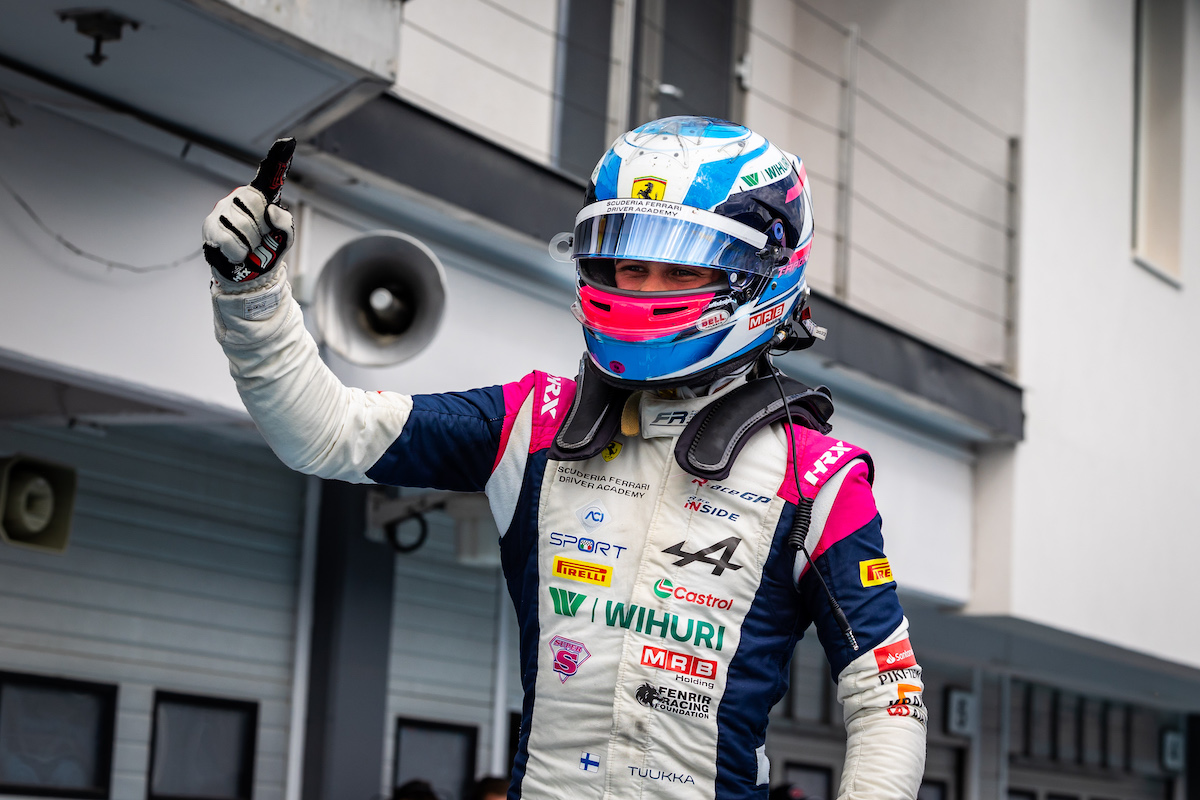
“In the end, looking back at the season it was pretty strong. We had some good and bad moments definitely. We were really strong in three weekends in the middle of the season and then we had some problems and [were] a bit unlucky at the end of the season. The season didn’t finish as I wanted but at least I finished third in the championship which is a pretty good result.”
R-ace team principal Thibaut de Merindol was at something of a loss to explain the loss of pace late on in 2024. “If I knew the reason, we would have solved it,” he mused at Monza.
The team had expected to finish the year strongly, particularly at Barcelona since its driver Tim Tramnitz had dominated both races there in 2023, but ended up dropping further off the pace.
Zachary David had some strong moments, topping his qualifying group at the Hungaroring, but his racecraft didn’t always match his qualifying speed. He could only manage 13th in the points.
Red Bull’s 16-year-old junior Enzo Deligny joined the grid after a single year in F4, but was able to top his qualifying group on his debut weekend at Hockenheim, and he is expected to continue in FREC next year to go for a title attack.
Badoer another newcomer to impress
How Van Amersfoort Racing failed to win a race in 2024 is still something of a mystery. The team continued to make huge strides, and with three rapid rookies was a regular challenger for points and wins.
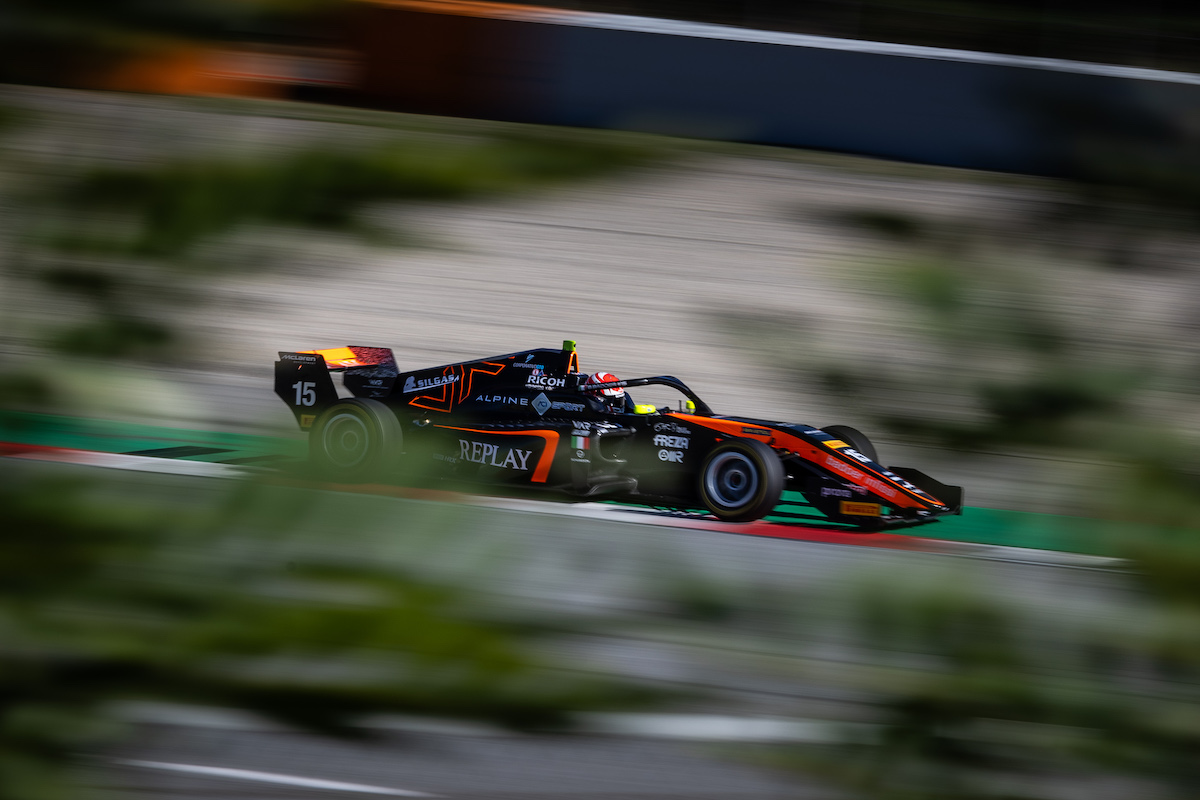
While team manager Danielle Geel unsurprisingly could not hide her frustration at losing out on second in the standings by a point in the final race, it was great to see the Dutch squad back at the front with all three cars. Its well-matched drivers pushed each other hard, while working together as a team to move forward.
Brando Badoer was runner-up in five successive races mid-season, but the potential to threaten Prema’s pair in the title race fizzled out after the summer break. He had been second in both pre-season tests, and shone with his one-lap pace in qualifying.
| Driver | Average gap to fastest time in qualifying group |
|---|---|
| Rafael Camara | 100.151% |
| Brando Badoer | 100.269% |
| Tuukka Taponen | 100.320% |
| Alessandro Giusti | 100.322% |
| Ugo Ugochukwu | 100.476% |
| James Wharton | 100.497% |
| Zachary David | 100.530% |
| Enzo Peugeot | 100.592% |
| Noah Stromsted | 100.595% |
| Pedro Clerot | 100.627% |
Nevertheless, he impressed everyone with his speed and consistency, earning full membership of the McLaren Driver Development Programme and an F3 berth at Prema. There is a feeling that once he gets a maiden win, which would be his first in single-seaters, he could be a regular on the top step.
Team-mates Pedro Clerot and Ivan Domingues backed up Badoer strongly. Clerot was a consistent top 10 runner, with a third and a fourth at Mugello representing the highlight of his year. Clerot will stay with VAR for a second season in FREC in 2025, and should be a clear title contender.
Domingues was one of the positive surprises of the year, running competitively in the first half of the year, although like his team-mates his season tailed off in the final rounds.
“Up until Paul Ricard I was fighting for poles a couple of times, for podiums, rookie podiums. And I think I improved my racing quite a lot from last year. In quali, at the beginning of the year the progress made was quite good. Now we fell back a bit again. But overall, it has been a good year,” he told Formula Scout.
Ruing some misfortune with red flags in qualifying, he still conceded that this had let him down in the latter stages of the year, although he took comfort from the improvement in his race pace, which he considered “my strong point at the moment. In the races every time we make up positions. I went from P20 to P10 in Red Bull Ring and from P14 to P10 [in Barcelona].”
French duo lead resurgent ART GP
The most improved team of the year was undoubtedly ART GP. After running Gregoire Saucy to the 2021 title, it hadn’t won a race since late in 2022. Three wins, and strong showings throughout 2024, helped ART GP jump from eighth to fourth in the standings, much to the relief and satisfaction of team manager Mathieu Zangarelli. R-ace was only 20 points further ahead.
With Alessandro Giusti, moving over from G4 Racing, and his successor as French F4 champion, Evan Giltaire, the line-up was as strong on paper as any in the paddock. When Giltaire won at Hockenheim it looked as though he could usurp his more experienced compatriot to become the team leader.

However, Giusti rapidly reasserted himself, becoming something of a ‘regenmeister’ with wins in the rain at Paul Ricard and Imola. “We are confident when we race in the wet, and that’s the key factor. And I think we won two races out of four and four podiums in the wet. I’m starting to like the wet racing as well. It’s pretty good,” he told Formula Scout.
Overall, he felt he had been “unlucky in some meetings in the start of the season. And then I think we found something in the car from Le Castellet, and it was good from that point.”
“It was a good few weeks after the summer break. We just had an unlucky weekend at the Red Bull Ring, especially in race two, where I got tangled, it could have been a podium.
“It’s good to finish the season like this. I always finish my season like this, in a strong way,” he said, before adding that “I think we regret a bit not to fight for the title, because we find the thing of the car a bit too late. But I think if we had found it a bit earlier, I would have been way more in contention for the title. But, it is what it is.”
Needing to win the final race to overhaul Taponen for third in the points, his charge was thwarted by the multiple safety car interventions, ultimately missing out by three points. He admitted to feeling “quite disappointed to miss third in the championship, we were close just a couple points away. We were just missing the win with there being a lot of safety cars unfortunately, we were the fastest car out there I believe, we did the fastest lap. But the Premas have been quite strong all the year with Rafa and James.”
Giusti has benefitted from the support of the Williams Academy, “physically, mentally, financially, which is quite important in this sport. I have a physio for all my races for my physical preparation as well. I’m starting to do some [Formula 1] sim at Williams, which is quite good,” he said.
Giusti will move across to MP Motorsport for his move to FIA F3 while Giltaire is expected to continue with ART for a tilt at the title.
Nael and Sainteloc come good
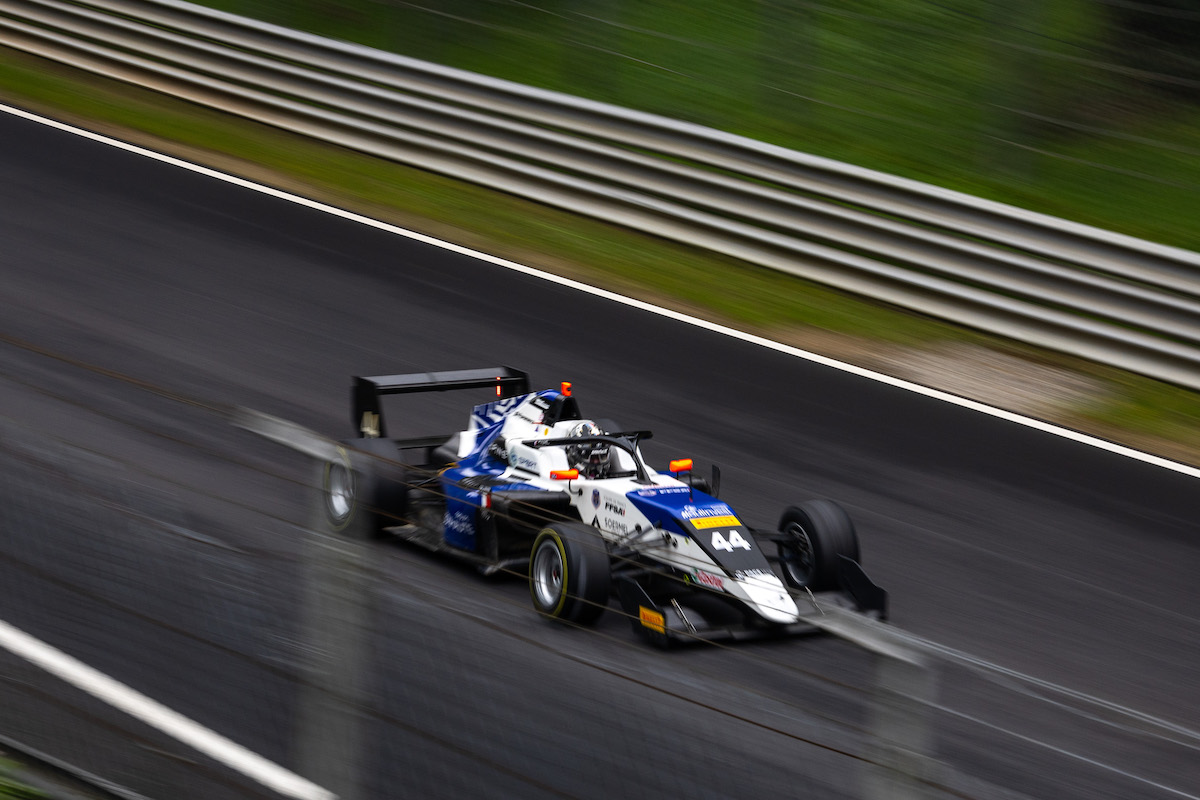
The only other driver to win a race was Spanish F4 champion, Theophile Nael, at Sainteloc Racing. Nael had been hotly-tipped ahead of the season but rather floundered in the first half of the year, scoring just 14 points in the six rounds before the summer break.
A few weeks away clearly worked, as he was immediately on the pace, taking a maiden win at the Red Bull Ring, followed by a first pole position at Monza.
“It’s not the season that we expected but still we had some good results,” he said. “For sure we had a great improvement with the car, with the team during the second part of the season so I am pretty happy. [We made the most progress] in quali. We were missing pace in quali, to extract everything of the tyres. That’s the key to this championship and now we are not too far from the top.”
Did he meet his own expectations for the year? “Yes and no,” he says. “We won a race. So, it’s quite good. To be honest, we didn’t expect that before [the season]. And now we are in the points pretty consistently. I think top five in each race is something we are able to do.”
Sainteloc was, in effect, entering its first proper season, with a strong, if all-rookie, line-up. For Nael, this “helped me a lot to develop the car and to see forward with the team, to work with the team. I didn’t know this car before. The team knew it but only a little.
“I hope that in my future I will be able to have a really good car, in a really top team. And if it’s not the case, I could be ready to work with a new team again and to develop the car to have a really good feeling and good feedback. We were all motivated to have some good results, and for sure it helped me a lot as a driver to work with a new team,” he said, as he conetemplates his graduation to FIA F3 with VAR.
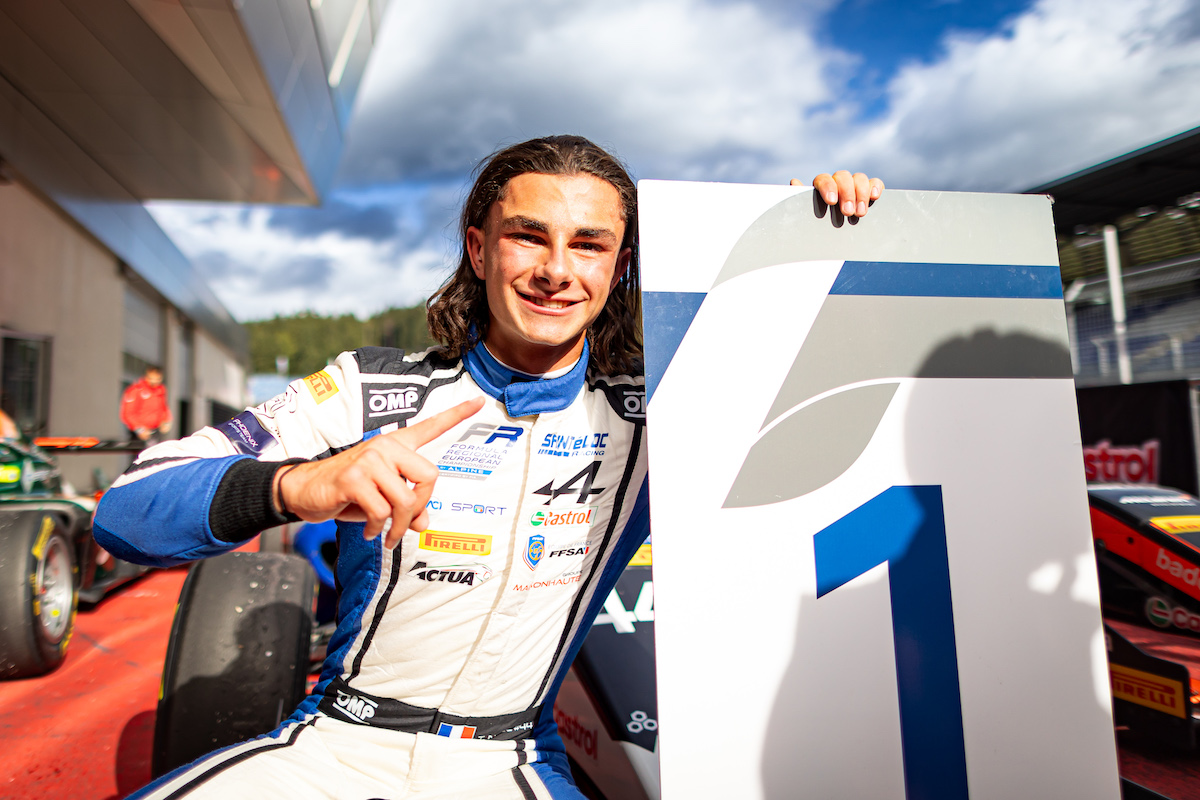
For team-mate Enzo Peugeot, the season started and ended strongly, with a dip in results mid-season, while Matteo de Palo also cursed some misfortune.
“I am happy with the progress I’ve done as a driver,” the Italian, often under the tutelage of Vitantonio Liuzzi in the paddock, said. I’ve grown a lot but the results don’t show how the season really went with a lot of unlucky DNFs and technical issues like in Barcelona, when we had really good pace.
“For sure, [I am] a bit disappointed because it’s not the place I want to be but I am looking forward to next year.”
De Palo, who will move across the paddock to Trident for a return to FREC in 2025, picked his comeback drive in Austria as the highlight of his season, “when I finished P4 from P13, [which was] one of the best races of my career, and not only because of the result but I did the same pace as the top guys and with very good overtakes. Barcelona could have been really good, the pace was to fight for the top three or four, [when] another guy crashed into me and I couldn’t do anything.”
Stromsted the rookie champion with R-P-M
Race Performance Motorsport may not have won a race but did wrap up the rookie championship with Noah Stromsted. The Dane had been quickest in pre-season testing but then failed to score a point at the same venue a week later, leaving team owner Keith Doneghan scratching his head in bemusement.
Stromsted was another to shine in the wet, taking second at Paul Ricard and pole in Austria by 0.77s. Four second-places illustrate his race-winning potential, and six points finishes in seven races at the end of the year, his consistency. In the seventh, he suffered from the lack of track time resulting from a penalty imposed on him for racing at Monza in FIA F3 ahead of the FREC round.
As the teams broke up for the summer, the team was still at a loss to put their finger on their lack of pace, yet after the break it all clicked.

“The start of the season was a bit of a struggle. Except for Spa, we were struggling quite a bit for pace. At Budapest we had no pace and we were struggling a lot. Zandvoort was ok, but it was a bit up and down and quite inconsistent.
“After the summer break everything has been going smoother. For some reason, we have been more precise with the car, my driving, and it’s just adding up to better results,” Stromsted explained.
There had been no eureka moment on set-up he felt, the improvement coming rather from “just natural progress, me and the team working better together, understanding each other more, what I would need from the car and what they need from my driving to try and change it and maximise it.”
Stromsted will also be heading for the FREC exit, moving up to F3 as Camara’s team-mate at Trident.
His team-mates at R-P-M, Giovanni Maschio and Edgar Pierre struggled all year, despite the support for the latter of driver coach Pierre-Louis Chovet in the garage.
Tales of what might have been
Of the remaining teams, Trident also failed to return to the highs of 2022 when Leonardo Fornaroli had secured the rookie title.
However, their fortunes were dealt a serious blow by the mid-season absence of Roman Bilinski, back for a third season with the team, having been part of that 2022 squad, after a road accident left him with a broken back.
After a frustrating qaulifying at Hockenheim, a pole and a second place finish at Spa-Francorchamps looked to have brought one of the pre-season title favourites into contention before his enforced absence, although a string of points finishes when he returned showed what we had missed.
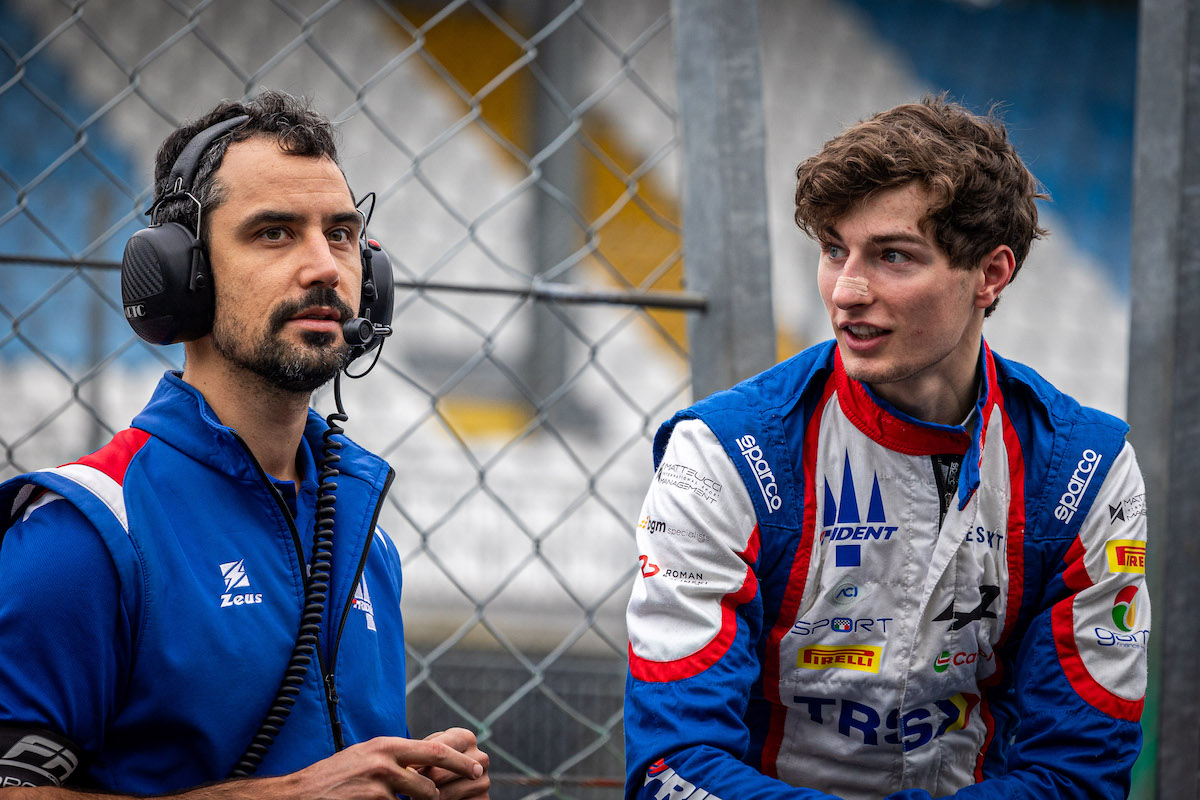
Even getting back into the car had been a battle for Bilinski. “The recovery has been crazy. Four months ago I didn’t know if I would even be able to walk and four months later I’m in the points in every race.
“Every day I’ve got rehabilitation. I’ve got people helping me with my back. I had to learn to walk again, which I haven’t said publicly [before]. It’s very painful when I drive, but I want to push for more. I’ve just had to really put a lot of effort in, even to get in the car, let alone drive it,” he told Formula Scout in Barcelona, his third weekend back in the cockpit.
In his absence, Michael Belov made yet another return to the category, impressing with two front-row starts and a podium at Paul Ricard.
Ruiqi Liu and, in particular, Alpine junior Niko Lacorte were however put in the shade by both Bilinski and Belov. Based on his results in 2024, Lacorte would undoubtedly benefit from another year in FREC rather than moving up to FIA F3 with a new team.
MP Motorsport also failed to hit the right notes in its final season in the championship, at least for now, as it focuses on Eurocup-3.
Nikita Bedrin was a late addition to the team, squeezing in seven rounds alongside his F3 commitments. Switching back-and-forth between cars did not cause him any problems, he said. Rather, “the whole team has been struggling a lot to find the right set up. Obviously, we’ve been working really hard, but we just couldn’t figure it out.
“[Monza was] actually the first time this year that we were pretty competitive, at least in the wet, but that is a big positive because in the past, like at Red Bull Ring, we weren’t competitive, even in the wet, but now we’re up there,” Bedrin explained in the Monza paddock.
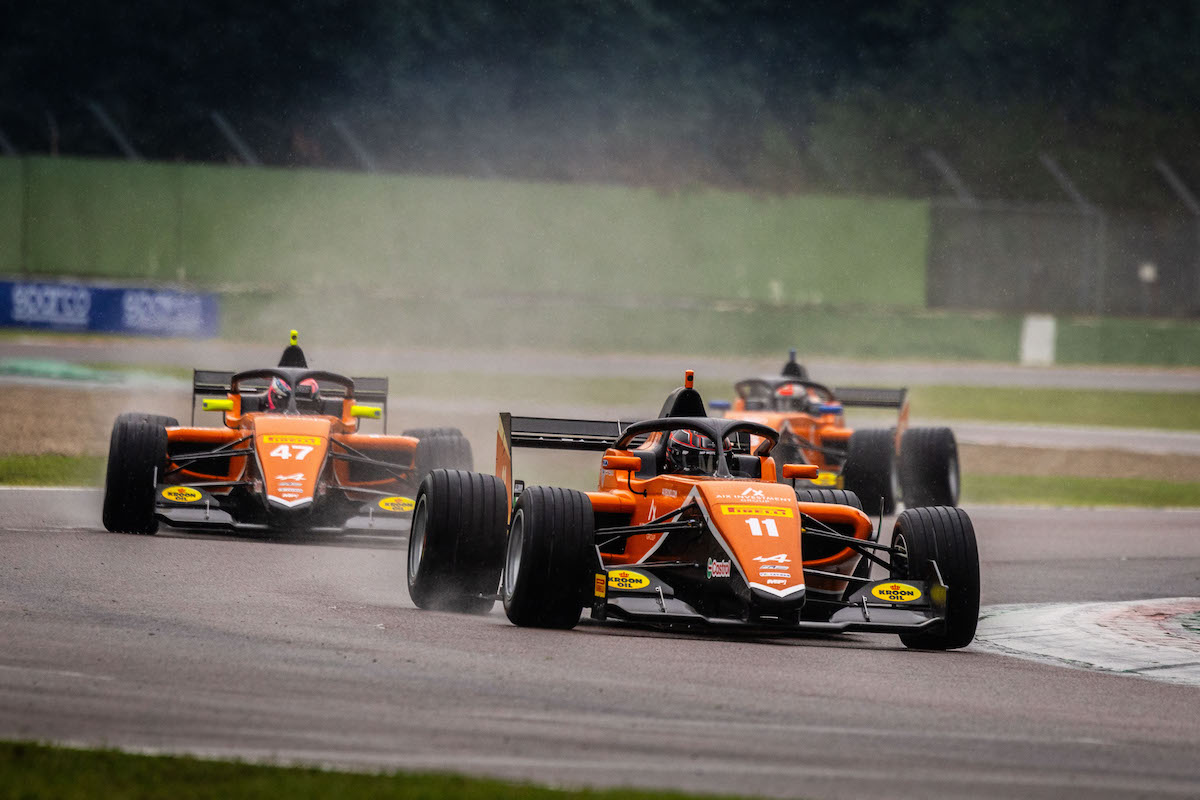
“[It’s been] quite a bad season in both championships. It hasn’t been going our way. [In Monza] we actually had some good potential, very good pace, then Q1 was cancelled, which completely screwed me over and I had to start last. In Q2 I was coming for quite an easy pole, from a driving perspective. I was behind Giusti who I was consistently catching up, and then one mistake made it all over, so I got screwed.”
Nikhil Bohra failed to repeat the promise he had shown in his first season while Valerio Rinicella also struggled, though he did salvage two sixth places at the end of the year.
Without the talents of Giusti and Belov, 2024 was always going to be tough for the plucky G4 Racing team, even with their ability to produce miracles with limited resources. In the end, Kanato Le scored all 27 of the team’s points, with a podium in France being the highlight.
Two teams failed to score at all. KIC Motorsport entered into a loose cooperation with Evans GP, who provided a stream of drivers from Asia and Australia. Nevertheless, the Finnish squad remained a source of good humour in the paddock and deserve to be back fighting in the top 10, as they had been in 2023 with Maya Weug, who made a one-off return with the team at Imola.
Unfortunately, the team that finished last in the standings was possibly the one with the most public, or at least social media interest: Iron Dames. The female-owned and run team made a late entry to field two cars for F1 Academy champion Marta Garcia and Mercedes-AMG junior Doriane Pin, the latter making the switch from endurance to single-seaters as part of a dual campaign with F1 Academy.
Both women were off the pace with average qualifying positions of 25th (Pin) and 28th (Garcia). Pin’s acclimatisation to single-seaters was not helped by having to miss five races through illness and injury.
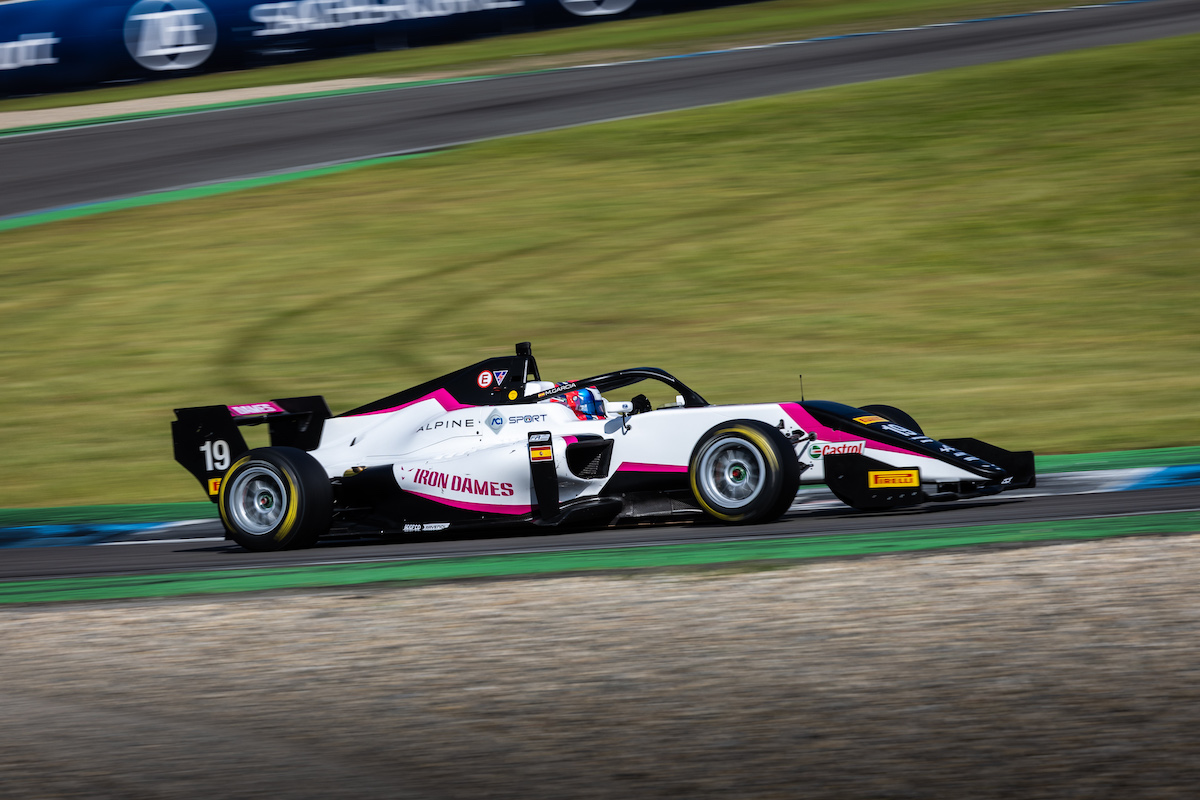
The Iron Dames team did not lack experienced personnel on the technical and engineering side, being able to take staff from its sister Prema team for the year. Both teams were scrupulous in ensuring that they operated on a fully-independent basis.
However, the team will not return in 2025, with Pin to join Prema as an expected fourth entry. Garcia has already announced publicly that she will be exploring opportunities outside single-seaters.
The initiative to place the F1 Academy champion in FREC with a fully-funded seat was an admirable one, although, as she told Formula Scout, it left Garcia with a massive drop off in finance once that deal finished. For 2025, F1 Academy has agreed to place its new champion in GB3.
The outlook for 2025 and beyond
The increasing competition from a buoyant GB3 championship, armed with a brand-new and exciting-looking car for 2025, and, to a lesser extent, Eurocup 3, was one of the main talking points in the Monza paddock.
As exclusively revealed by Formula Scout, the FIA took a decision, backed by most of the FREC teams, as well as other championships outside Europe, to defer the introduction of its own new car until 2026.
GB3 has made its intentions clear by publishing an eight-round calendar with four outside Britain, giving it six rounds on current F1 tracks, including Silverstone twice.
Though Formula Scout understands that budgets for GB3 have edged upwards, so that on a per-race basis, they are comparable with the 10-round FREC series, there is no room for complacency. The 2025 FREC calendar includes three non-F1 circuits in Paul Ricard, Hockenheim and for the first time Misano, replacing Mugello.
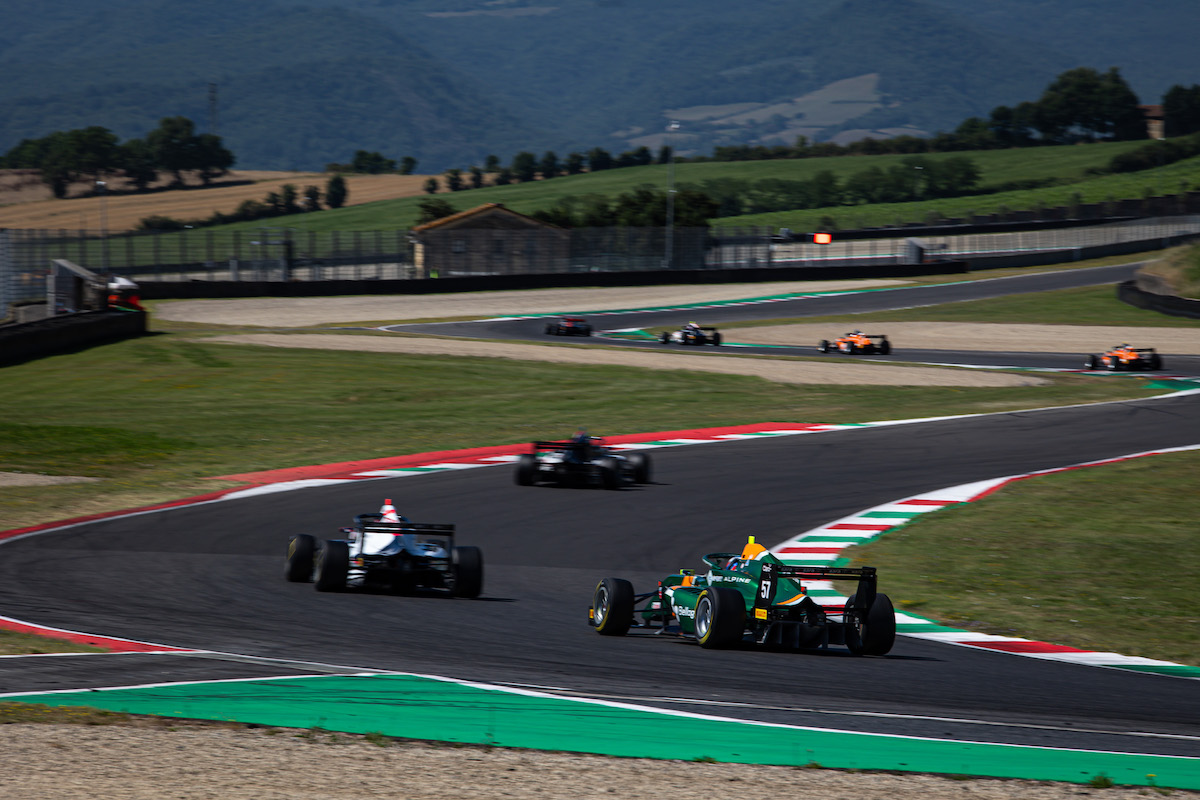
The car itself, the current Tatuus T-318, never entirely popular with drivers even when introduced, is now beginning to show its age and the series desperately needs the new car to have a ‘wow factor’.
Rumours circulate that the supply of the Renault Megane-based engine is uncertain, with other manufacturers such as Toyota possibly in the frame to step in. But where would that leave a championship that is marketed and operated as ‘by Alpine’?
The end of Alpine/Renault as a manufacturer of engines for F1 has, in itself, no impact on the company’s support for junior categories, and it has been a mainstay of junior single-seaters since the early 1970s.
The FIA has recently announced a global tender to a single supplier of tyres to all Formula Regional series worldwide, based on a specification for 15-inch rims, compared to the 13-inch currently used.
Despite these concerns, and the loss of two teams, albeit with MP being replaced by a new team, CL Motorsport, there are grounds for optimism.
The decision by Freddie Slater’s management to opt for FREC as his main programme adds significantly to the series’ credentials. At present, it looks as though the top Italian F4 drivers, as well as some from France, will join the championship with Giltaire and Deligny expected to join Clerot in returning.
Though not part of the championship, the move to run the historic Macau Grand Prix for Formula Regional cars is a major boost to the category, in Europe and globally.
The series organisers have increased their efforts to welcome fans, with “meet the driver” autograph sessions being very well-attended.
And last, but not least, the championship’s alumni are making waves further up the ladder – Gabriel Bortoleto, Franco Colapinto, Andrea Kimi Antonelli, and likely Isack Hadjar, have flown the FREC flag in reaching F1, while other graduates such as Fornaroli, Mini, Dino Beganovic, Zane Maloney and Paul Aron have excelled in FIA F3 and Formula 2.
Additional reporting by Alejandro Alonso Lopez